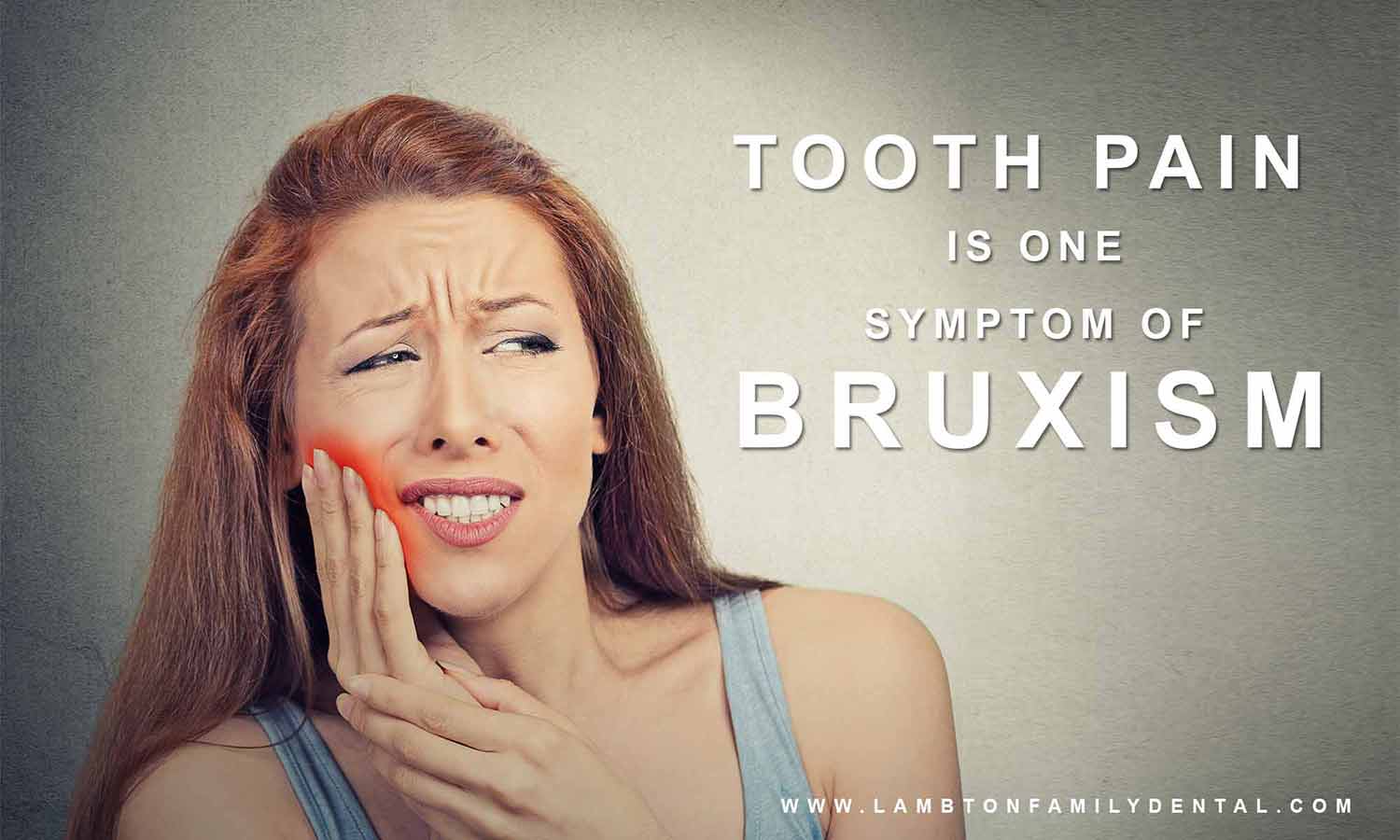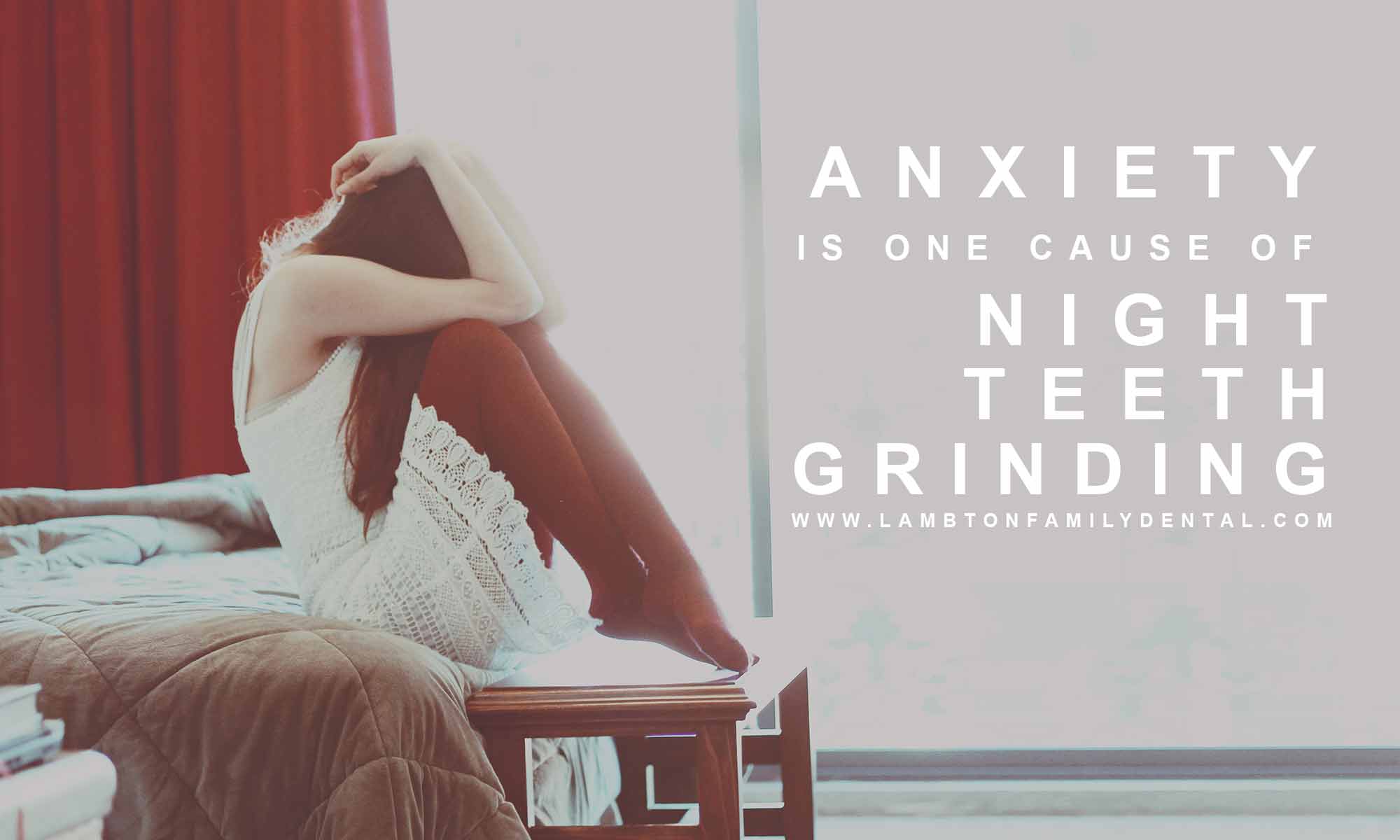Teeth grinding is a fairly common movement disorder that usually occurs during sleep (also called “nocturnal bruxism”). This behaviour can happen during the day as well. Although more common in children, roughly eight percent of adults are nighttime teeth grinders. The occasional bout of bruxism is no cause for alarm (and happens because of a number of factors). However, if it occurs regularly, a visit to your family dentist is needed to discuss ways to prevent damage to both teeth and jaws.
Grinding is also known as bruxism. The term “la bruxomanie” was used for the first time by Maria Pietkiewicz in 1907 and is derived from the Greek word brygmós, meaning “gnashing of teeth.”
People who grind their teeth at night may have other sleep disorders (such as sleep apnea and snoring) that contribute to interrupted sleep and fatigue-related problems. When bruxism happens in your sleep, you may not be aware that you have it. If the following symptoms sound familiar, seek treatment from your dentist.

Symptoms:
- Teeth grinding or clenching (which may be loud enough to wake up your sleep partner)
- Teeth that are flattened, fractured, chipped, or loose
- Worn tooth enamel, exposing deeper layers of your tooth
- Increased tooth pain or sensitivity
- Tired or tight jaw muscles, or a locked jaw that won’t open or close completely
- Jaw, neck, face pain, or soreness
- Pain that feels like an earache, but no ear problem is present
- Dull headache around the temples
- Damage to the inside of your cheeks from chewing
- Disrupted sleep
Note which symptoms have manifested themselves and talk to your oral healthcare provider.

Causes:
The causes of bruxism are largely unknown, but doctors have linked it to a combination of factors that are genetic, physical, and psychological. Some related links to teeth grinding include anxiety, stress, alcohol consumption, cigarette smoking, caffeine consumption, sleep apnea, snoring, and fatigue. It is important to note that (in most cases) psychiatric or psychological factors do not play a role.

Credit: Pina Massina
Risk Factors:
Although the main causes of bruxism have yet to be identified, there are several risk factors that make some people more susceptible. These are:
- Stress and anxiety can lead to teeth grinding. A 2014 BioMed Research International study concluded that bruxism was on the rise among adults due to an increasingly stressful world, and that stress and bruxism were correlated.
- Age: Bruxism is common in young children, but it usually goes away by adulthood. However, there has been an increase in adults seeking treatment for nocturnal (nighttime) bruxism.
- Personality type: Extraversion and neuroticism were two personality traits cited as being more prone to adult bruxism, as well as people who perceive anxiety more acutely.
- Medications and other substances: Bruxism may be an uncommon side effect of some psychiatric medications, such as certain antidepressants. Tobacco, caffeine, alcohol, and recreational drugs may also increase the risk of bruxism.
- Family members with bruxism: Sleep bruxism tends to occur in families. Another 2014 study showed that nine out of 10 studies concluded that “bruxism appears to be (in part) genetically determined.”
- Other disorders: Bruxism is sometimes associated with certain mental health and medical conditions. These include:
– Parkinson’s disease
– Dementia
– Gastroesophageal reflux disorder (GERD),
– Epilepsy
– Night terrors
– Sleep-related disorders such as sleep apnea
– Attention-deficit/hyperactivity disorder (ADHD).
Concerns:
Teeth grinding can lead to several adverse reactions and complications for both oral health and overall physical health:
- Damage to teeth, crowns, other dental work, and/or your jaw
- Headaches caused by tension created by grinding your teeth
- Face and jaw pain that may become increasingly severe
- Damage to the temporomandibular joints (TMJ) located just in front of the ears that lead to clicking sounds in the jaw
- Interrupted and/or poor quality sleep

Credit: Umanoide
How is bruxism diagnosed?
If you’re experiencing any of the signs and symptoms listed above, mention this to your dentist at your next appointment. If the symptoms are acute, make a special appointment immediately. Your dentist will look for the following signs of bruxism:
- Tenderness in your jaw muscles
- Broken or missing teeth
- Other damage to your teeth (such as worn areas)
- Using X-rays, your dentist will look at the underlying bone and assess any other below-the-surface damage
This exam can also detect other disorders that may have similar symptoms, such as TMJ issues or other health conditions.

Treatments:
In some cases, no treatment is required — especially with children who tend to grow out of bruxism. If, however, your bruxism is interfering in the quality of your life, there are several approaches that your dentist can take to help you.
The first is to protect your teeth from any further damage using a splint or mouth guard. These separate the teeth and stop them from clenching against each other. These appliances are made of hard acrylic or soft materials and are custom designed to fit over either your upper or lower teeth.
If the damage to your teeth has already progressed and has led to sensitivity or the inability to chew, your dentist will reshape the chewing surfaces or use crowns to repair the damage.
These approaches don’t cure bruxism, but they help mitigate the damage the teeth grinding can do or has done to your teeth and jaws. To actually address the bruxism itself, you might need a behavioural modification approach, such as:
- Stress management through classes or sessions with a trained counsellor/therapist.
- Practicing proper jaw and mouth positioning during the day, which has been shown to lead to improved positioning at night. Your dentist can help you with these techniques.
- Biofeedback has been known to provide some relief for particularly ingrained behaviours. Using monitoring equipment and procedures, patients are taught how to control the muscles in their jaws.
Medications:
Medication has not proven to be very effective in treating bruxism, but there are a few prescriptions or approaches that may work for some patients:
- Muscle relaxants to take just before bed
- Botox injections
- Stress or anxiety medications that might help relieve the underlying cause of the bruxism
How to minimize bruxism:
- Practice good “sleep hygiene.” Go to bed at the same time nightly and wake up at the same time each morning. Place all electronics outside of the bedroom, and keep your room temperature a bit cooler.
- Keep stress levels low. Listen to music, take a warm bath, do some light exercise, or read a mellow book before falling asleep.
- Limit caffeine. Drink herbal teas from early afternoon on instead of caffeinated drinks or coffee. Remember also that alcohol can worsen bruxism, so limit that intake as well.
Schedule regular check-ups with your dentist. Seeing your dentist regularly gives them a chance to monitor changes to your teeth or jaw and help you find a way to reduce the severity of bruxism and its side effects.
Bruxism goes beyond the annoyance of disturbing your sleep partner’s rest; it’s potentially harmful to your teeth and/or jaw. Teeth grinding habits should be monitored and followed closely by your family dentist who treats damage and helps you change the behaviour. Get a good night’s sleep and keep your teeth safe.
For dentistry in Sarnia, reach Lambton Family Dental at (519) 344-5747. Our licensed health care professionals have years of experience, and our staff will help put you at ease. Relieve your tooth and jaw pain caused by bruxism or take care of other oral health problems. Call or schedule a consultation by using our online form.

